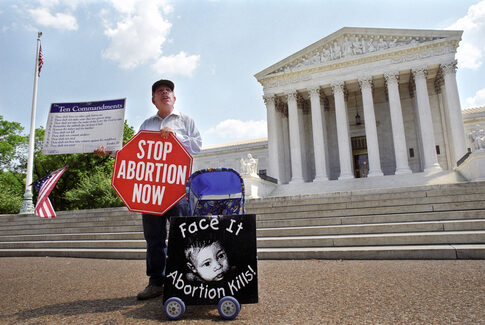The GOP in Texas experienced a win as the Supreme Court upheld a ban on emergency abortions. The abortions was a violation of Texas law. No reasons were given by the court regarding their decision. The Biden Administration has stated they believe the federal position should be codified in the U.S. Constitution.
Supreme Court’s Decision
The U.S. Supreme Court refused to hear a challenge to Texas’ restrictive abortion law. This decision upholds the state’s ability to limit emergency abortions, even when patients’ health may be at stake. There was no further detail by the court as to why they made that decision. This continues the debate over states rights and the federal position regarding abortions.
The Biden administration, representing federal interests, had urged the Court to reverse the lower court’s ruling. At the core of the argument is the Emergency Medical Treatment and Labor Act, requiring hospitals to administer essential care, which could include abortions in dire circumstances. This decision continues to pit the Biden Administration against the states rights.
BREAKING: Texas Supreme Court rejects challenge to abortion laws
The court ruled against 20 women who said they were denied medically necessary abortions, saying the medical exceptions in the law were broad enough. https://t.co/4FpL3sqJXP
— Texas Tribune (@TexasTribune) May 31, 2024
Implications for State and Federal Authorities
The Texas Supreme Court played a significant role by affirming that the state’s abortion laws do not necessitate delaying medical actions until a woman’s life is imminently at risk. This aligns with a possible interpretation of federal law. Nevertheless, the Court’s decision intensifies the efforts to discern the actual application in emergency rooms. Medical practitioners express unease about the law’s terms, fearing retribution due to ambiguity over permitted medical exceptions.
“The Supreme Court on Monday let stand a decision barring emergency abortions that violate the law in Texas, which has one of the country’s strictest abortion bans.”
This upholds the previous judiciary inclinations seen after Roe v. Wade was overturned, leading to enhanced restrictions. The left continues the status quo statement that women’s lives are in jeopardy with this decision. They feel hospitals are fearful of making medical decisions accordingly.
Legal and Political Repercussions
The case gained nationwide attention as it reflected growing state-level challenges in post-Roe America. Leaders, predominantly on the Democratic side, promise to overhaul these laws should they assume power. Such assurances become prominent campaign points as the presidential elections loom, pushing political candidates to define clear stances on healthcare legislation.
“Sadly, what we know is that there are anti-abortion advocates who will always question [a doctor’s] decision,” said Molly Duane, senior counsel for the Center for Reproductive Rights. “I don’t know how all of this will actually function in practice … the fact that true exceptions do not exist in practice will continue to be the norm.”
Most recently, Texas courts have leaned into this legal landscape with other states potentially emboldened to follow suit, mapping a powerful narrative about state-sovereignty in American federalism. Justice Brett Busby’s concurring opinion highlighted potential future legal challenges on grounds of vagueness in the law, lending a measure of unpredictability to its implementation.

